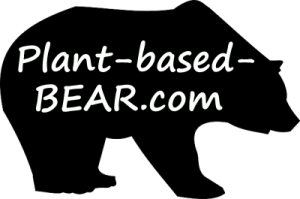So what is a plant-based bear? I’m glad you asked!
Plant-based is the notion that it’s healthy and good to eat a whole food, plant-based (WFPB) diet. Here is a good article with more information on that. Here on the Plant-based Bear, we’ll most-often use this definition, slightly modified from the article linked above:
- Whole food describes natural foods that are not heavily processed. That means whole, unrefined, or minimally refined ingredients.
- Plant-based means food that comes from plants and doesn’t contain animal ingredients such as meat, milk, or eggs.
A whole-foods, plant-based diet lets you meet your nutritional needs by only eating natural, minimally-processed foods where none of the ingredients come from animals.
Or, as one guy puts it, “Just eat plants!!!”
Some followers of this philosophy also cut out the use of honey (it’s created by animals–bees), but I’ve not ascribed to that notion.
Also, different from a “vegan” diet is the fact that I will attempt to use as little oil as possible. Why? Because all oils release carcinogens when heated that are hazardous, and they’re a dense source of calories. You don’t have to take my word for it, but, it’s also not really debatable with me. (Check out “Why should I avoid oil? Isn’t oil healthy” about 3/4 of the page down here, or this.) So, while I cannot control the use of oil at restaurants and out and about, when cooking at home, I certainly can! (And, when at restaurants, I can make good choices about what I order to not be deep-fried, for example.)
Finally, my focus is to eat plants. But, I’m going to try to take it easy, or use less of:
They’re not outlawed, and I’ll enjoy some home-made peanut butter or other nut butters, and almost every plant-based cheese or cheese sauce recipe will use cashews, etc. But we’re going to try to go light on these things, as again, they have so many calories packed in such little packages.
I’m also making this a way of life. It’s not a “diet” in the sense that I don’t expect to just do this for a short while, and then return to my dairy-loving, highly-processed way of living. A diet is something you get on, and then get off, cheat on, or just fail at. There’s no need for that much pressure. Here I’m just trying to change my way of living, no pressure at all!
A bear? Isn’t that a wild animal? One Urban Dictionary definition says this:
The most common definition of a “bear” is a man who is hairy, has facial hair, and a cuddly body. However, the word “Bear” means many things to different people, even within the bear movement. Many men who do not have one or all of these characteristics define themselves as bears, making the term a very loose one. Suffice it to say, “bear” is often defined as more of an attitude than anything else – a sense of comfort with our natural masculinity and bodies that is not slavish to the vogues of male attractiveness that is so common.
While I’m not a hairy guy, there is some facial hair, and I’ve identified with the “bear community” for well over a decade.
So there you have it! The Plant-based Bear will have recipes (usually “stolen” or modified from somewhere else), commentary on cooking, nice finds at the market, or whatever comes to my mind.
So why not the “Vegan-Bear”?
I don’t much like the term “vegan”, although it’s one of the first words I’ll type into Google when looking for a new recipe or something to try. Vegans are described in a couple entries in the Urban Dictionary this way:
People who refrain from eating any animal products (or anything derived from animal products) or using animal products such as leather, silk, or wool. It is a more strict form of vegetarianism. People who are vegan are often passionate about their veganism.
Most people will assume that because you follow a vegan lifestyle, you must be a pretentious jerk (or in a cult).
Another entry seems to “get it” more:
Being vegan doesn’t mean you have to be a part of any organization (i.e. PETA) or chain yourself up and protest. It just means that you choose to follow a 100% herbivore diet.
“Vegan,” although very similar to what I’m trying to do, seems to encompass a much larger philosophy, gets linked in with being anti-animal cruelty (not that I’m for animal cruelty in any way), and goes far beyond what you eat. I’m attempting to eat this way mostly for health and weight-control reasons, not because I’m opposed to leather and just renewed my membership in Greenpeace.
I’m here to share my experience, and what I’ve found to work or not work for me, not preach at you, or try to convince you of something, other than to try some of this tasty food for yourself!
More information about me, perhaps, to come! Here’s to happy eating!
Get in touch at [email protected].
Like this:
Like Loading...


